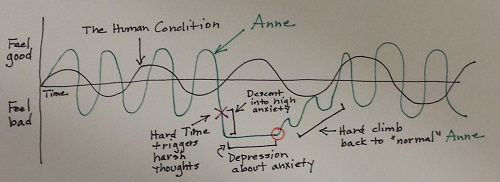If I could become aware of the red X of a hard time happening – or just after – I might make it.
I postulate that the human condition is an experience of ups and downs, highs and lows within an average range, spaced over a generally regular amount of time. I believe, through nature and nurture, that I cycle between “feeling good” and “feeling bad” with higher highs and lower lows more frequently than average.
Click here for a larger view of the graph.
Ten days ago, my purse was stolen from my downstairs kitchen counter in the early morning hours while I was upstairs writing, just like I am now. I called the police, I’ve done the things one is supposed to do, and I was asked not to share more at this time because of several potentially related occurrences and an on-going investigation. Regardless, I experienced the event as what I’ll term a “hard time” and was given the uninvited “opportunity” to further become conscious of my thoughts.
For me, a “hard time” is when I experience distress over 1) an event or happening over which I have little or no control (the Virginia Tech shootings, my marriages failing, the purse-stealing), and 2) criticism or reproach from someone to whom I assign or relinquish power or authority over me (mentors, bosses, corporate or community leaders).
I have an on-going low at present from a newly ending marriage, so pretty much anything that happens, good time or hard time, is happening during a dip. Nevertheless I was gratified by how well I was handling the stolen purse, canceling credit cards and other logistics, even wishing the thief insights from what he or she (they?) had done. And then, with no awareness of before and after, I found no joy whatsoever in life.
Contents of the Stolen Purse
A former student posted on my Facebook page a comment stating the equivalent of “We are not alone.” I felt a flicker of awareness. I Googled “how does one recover emotionally from a robbery.” Thank heavens for the wisdom of former students and for Julie Bawden Davis and the Los Angeles Times.
Knowledge that I was having a normal, common reaction wasn’t enough, however, to keep me from descending further into a state of unrelenting anguish.
“It must be what you’re saying to yourself,” my supervisor said, when I reported my state of distress to her.
When I went to a department store with empty hands, feeling exposed and vulnerable without a purse strapped over my shoulder, I looked at the rows of handbags and picked up one or two and then I was crying and I walked out without a replacement purse.
Later, I had to go deep to discover what I was telling myself automatically and unconsciously: “I was wrong to leave my door unlocked and ajar so the cats could go in and out. I brought the theft on myself. I should be ashamed of myself. What’s the matter with me? I deserve having my purse stolen as just punishment and I do not deserve a new purse.”
I choked up when I typed that. I used Roget’s International Thesaurus this morning, not the dictionary version, to put words to all the anonymous letters of my harsh thoughts with all their nuances so that I can see and know my opponents by name. All my words led me over and over again to categories “638 Wrong” and “999 Badness.” My sentences are heinous, designed as only someone intelligent, knowledgeable, insightful and articulate could craft them to, systemically, cause self-annihilation.
But some part of myself reacts to those same sentences. I fall into high anxiety. “Do I have to let this happen? Is there something I can do, some way I can control this? Can I keep it from happening? Do I have to feel this way? What can I do, what can I do?” Because individuals do not have control over life’s events or over what people say or do, there is nothing I or anyone can do. That’s the human condition. But something about the inability to make a difference provokes in me feelings of powerlessness, helplessness, and hopelessness. Those are the three -lessnesses of depression.
[A mentor graphed that process in the air for me, hence the image accompanying this post. Again, click here for a larger view of the graph.]
So far, I have been able to climb out of depression, but I am uncertain what is the catalyst for the orange circle marking the upturn. My current theory is that the lift is both intangibly internal – I have never once, in my 54 and 9/12 years on the planet, not gotten out of bed in the morning – and external, perhaps from some form of reassurance, words from a mentor, a friend, a family member or a colleague, that I am not all wrong and all bad but that I, at least in their perception, have some merit and value.
Whew!
Wanting Up from Down
This is not on-going. These are intermittent states in which I discover myself or which others point out to me. Even if I could create absolute protection for myself from ever being robbed again – which I cannot, the stolen purse now having introduced me to the impossibility of perfect safety – I see I am not safe from the threat of, or the presence of, my own harsh thoughts. Even before someone invaded my home, I was living under constant threat of attack by my own mind.
I postulate that I am not alone, that in the pain of that descent into anxiety and that resignation into depression is an origin of addiction, the subject of which I am a passionate student. When I am down low, I seek the up that would restore homeostasis. When I am desperately seeking relief from desperate agony, I am one with that feeling. I have no thoughts.
Why, I might even steal a purse from a downstairs kitchen counter, without a first or second thought, even with the risk of getting caught because the owner is in the house upstairs(!) because with the money I can buy something that will relieve my agony.
For me, even when I am all-feeling and no-thought, some sort of tortured self emerges in bursts, 15% anger, 85% sorrow. In public, I can maintain equanimity most of the time. In small groups, the anger can peak. But it is with those I am most intimate that the sorrow erupts and flows like lava.
The bursts are hard on me and hard on the people who do care for me or want to care for me. A friend half-teasingly coined the acronym “TMA” for “Too Much Anne.” A mentor added another A – “Too Much Anne Agitation.” Whether TMA or TMAA, it’s overwhelming and exhausting to, at times, be me. And for others, it’s overwhelming and exhausting and frustrating to be with someone who bursts, and then dispiriting to be with someone who becomes and stays dispirited.
Enough.
Compassion for Thinkers of Red X Thoughts
My plan: I become aware of the red X of a hard time happening – or just after – I observe myself start the sentences in that brilliantly crafted epistle meant to undermine and destroy a self, I call forth my heart full of compassion for anyone and all who suffer from thinking thoughts like that, then I begin to choose from among the many tools I have learned along the way to reassure and to strengthen myself. I expect this process to take time and practice.
The end in mind? To hear, perhaps, some day, instead of “Too Much Anne,” “YMA”: “Yay! More Anne!” I can’t please all of the people all of the time and I will please none of the people some of the time. But I would love for those close to me to have a more pleasant time in my company,
And I am determined to prove the power of consciousness in my own life. I am determined to be able to handle life’s events – shootings, divorce, theft, whatever comes – with my own mind and brain and heart.
I am hell-bent on enlightenment.


Anne, Things do happen to us all. I have a saying I wrote down for my children a few years ago when they were in their teens and at least our daughter thought everything was a crisis.
“Life is a procession of events, some to be cherished and some to be endured. They all contribute to the person we are to become.”
I know it seems so smug with what you have been going through. I feel for your pain and your anger. Sometimes it helps me when I am struggling to think about the other challenges I have overcome and how I grew from those. It gives me some perspective about what I need to learn. Hopefully your events that you have endured lately, will help you grow into an even more wonderful person. I think you are pretty special already.
I so appreciate the wisdom you shared with your children, Karen, and thank you for sharing it here, too.
And since I sometimes think in diagrams and tables, I can imagine the power of making of list with two columns: “Challenges I have overcome” and “How I grew.” Wonderful suggestion, Karen! And thank you so much for your words of support.